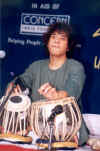|
|
|
||||
|
APRIL 2002 Contents
Travel 'Baikunth'
- the mountain Literature Visual Arts Jatin
Das - 4 decades of Music Zakir
Hussain - Compelling Hakim
Ajmal Khan's ancestral Business & Economy Performing Arts 'Fakir
of Benares' -1922 French Films Revathy
Menon's 'Mitr - my Books 'Knock
at Every Alien Door' People
Books
|
|
|
|||
| print gallery | |||||
|
Zakir Hussain - Compelling Beats interviewed by Sanjeeb Mukherjee "I wanted to bring tabla out of the realms of just being an accompanying instrument .. today the tabla has its separate musical identity throughout the world, which I feel is its rightful place." - Zakir Hussain
The resonance of his tabla can be heard not just in India but all over the world. Zakir Hussain, who was honoured with the Padma Bhushan on January 26, 2002, says the high state award is the culmination of years of hard work. Son of the legendary Ustad Allah Rakha, the young maestro’s consistently brilliant and exciting performances have gained him a towering international image. Apart from his solo triumphs he has been the favourite accompanist for some of India’s greatest musicians and dancers like Ustad Ali Akbar Khan, Pandit Ravi Shankar, Birju Maharaj and Pandit Shivkumar Sharma. Starting his professional journey from the age of eight, Zakir Hussain has bridged the Hindustani and Carnatic traditions by performing with North and South Indian masters and presenting percussion concerts both as a soloist and with other drummers. He was in New Delhi recently to participate in a concert in aid of Concern India Foundation, Zakir Hussain spoke at length about his career and his future plans. Excerpts from the interview… How has your father, the great Ustad Allah Rakha, influenced your life? My father was my friend, philosopher, guide and above all my guru. He had an unflinching love for tabla. It was the reason for his existence….his life. If by chance I can be half as good as him I will consider myself fortunate and blessed. You’ve always been fascinated with fusion music revolving around the tabla. Is there any specific reason for this experimentation ?I wanted to bring tabla out of the realms of just being an accompanying instrument, my aim was to give it the same status as enjoyed by other instruments. Today the tabla has its separate musical identity throughout the world, which I feel is its rightful place. Sometime back you said you were contemplating giving up playing the tabla. What was the controversy all about? Actually I was misquoted. What I said or meant was that I was just planning to cut down on my assignments. Some misinterpreted it as I was quitting playing tabla, which is absolutely rubbish. How can I stop playing tabla, it is as vital for me as air which I breathe. There seems to be an overall declining interest in classical music. Does that in effect mean artists have not been promoting it properly? I can talk only of tabla. Promotion cannot be of any help if you are not talented. Not that I mean that the present crop of artists are in any way less talented. There are some excellent artists like Akram, Rashid, Aditya, Anuradha Pal. But for them to gain name and fame will take some time. I too had to toil hard for years to get to my present position. Above all no tabla player can be a soloist at the very onset. He or she has to first start as an accompanist and then move on to solo performances. Does having an illustrious parent help in getting a foothold in the world of classical artists? The name of a parent can’t help if an artist is not talented. Artists like myself, or Amjad Khan’s sons, Amaan and Ayaan or even Anouskha Shankar, have become famous because we have ourselves toiled hard at honing our talents. You cannot pull crowds by simply invoking the name of your father or mother. Your fusion band Shakti has re-grouped again. Any reason for that? The re-grouping has been extremely heartening. We have also cut a new album, which has been very well received. In fact it has been nominated amongst the five best world albums. We have also done three hugely successful tours. It is said that the style you have in tabla is a mixture of many gharanas, though you belong to the Punjab Gharana? The pattern that I have adopted is nothing new, even well known Ustads have played a mix of many styles. If you belong to a certain gharana that does bind you with that style and stop you from experimenting. Gharanas only provide you with the base upon which an artist has to build his or her own style. And this trend is more pronounced in case of instrumentalists. Some years ago you did a lead role in Saaz. Do you plan to act in more films? Not in the near future. I did Saaz because I liked the script and it was being made by a very close friend, Sai Paranjape. I feel that I’m a better tabla player than an actor. I prefer a different kind of association with films---music. I have occasionally given music for films like Ismail Merchant’s In Custody and for Bernardo Bertolucci’s Little Buddha.
______________________
|
|||||
| Copyright © 2000 [the-south-asian.com]. Intellectual Property. All rights reserved. | |||||
| Home | |||||
